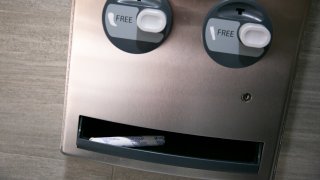
A week after the Virginia Senate unanimously passed a bill that would require public schools to provide free menstrual products in bathrooms, Maryland lawmakers are trying to do the same.
A Maryland bill would require public schools to provide menstrual products in dispensers in school restrooms, available at no cost to students. Schools would need to provide dispensers in at least two restrooms per school by Oct. 1, and in all restrooms by August 2024.
Del. Kirill Reznik, who sponsored the bill, said the measure serves students.
“We don’t ask students to bring in their own toilet paper or hand soap, nor do we make them go to the nurse’s office to get either of those items,” Reznik said in an email. "When we make students go to the nurse to get menstrual hygiene products, potentially waiting in line behind students with actual medical needs, we cause them to miss more class time. We create more work for the nurses, and we add to the stigma surrounding menstruation.”
The Maryland bill has 51 cosponsors in the House of Delegates. Go here to learn more about the legislative process.
Reznik is set to speak about the bill at a hearing Thursday. Students ranging from elementary schoolers to graduate students are expected to attend and testify.
Local
Washington, D.C., Maryland and Virginia local news, events and information
Just four states — California, Illinois, New Hampshire and New York — require schools to provide free menstrual products in women's bathrooms.
D.C., Maryland and Ohio have eliminated the tax on feminine hygiene products. Virginia reduced its sales tax rate on these products, effective at the start of January.



